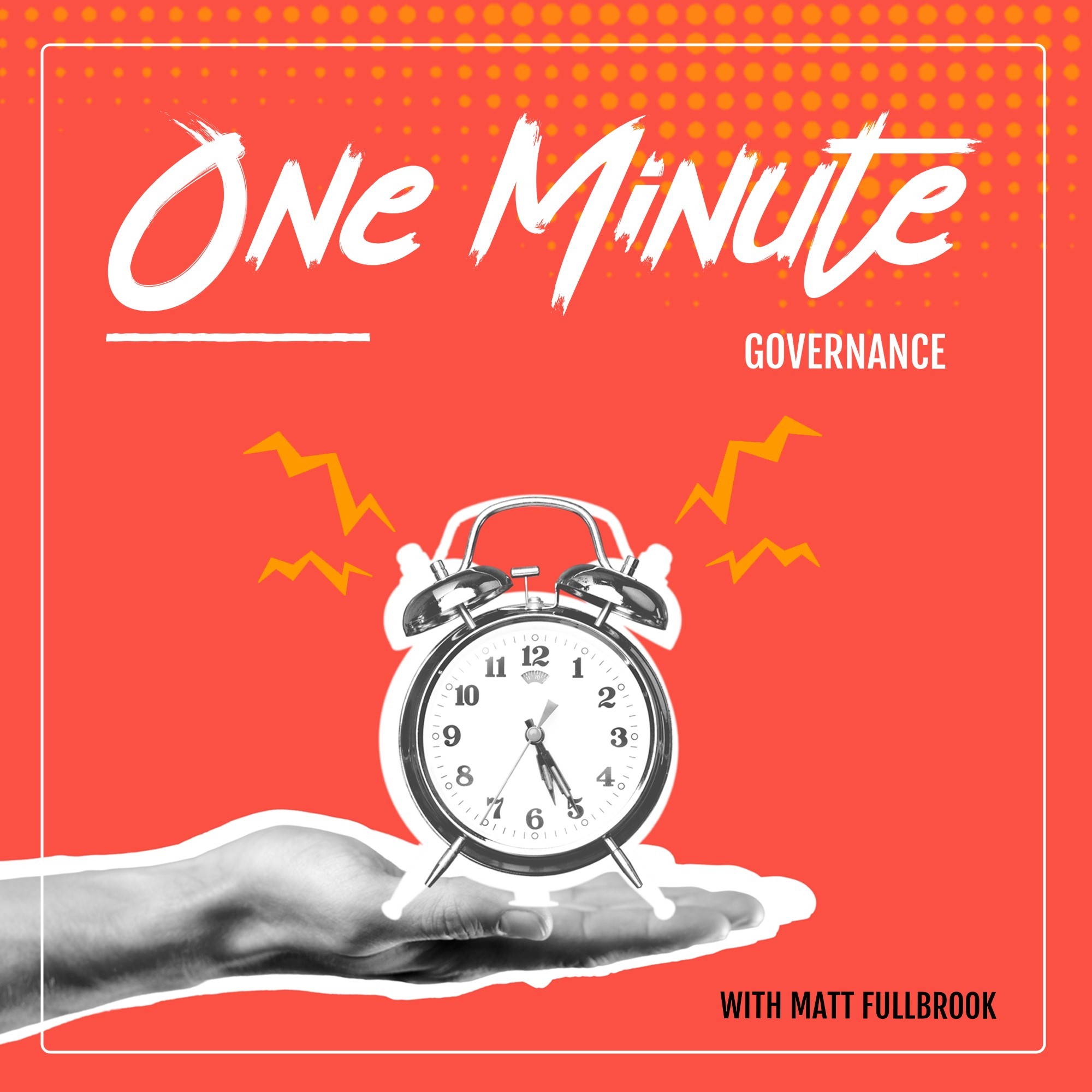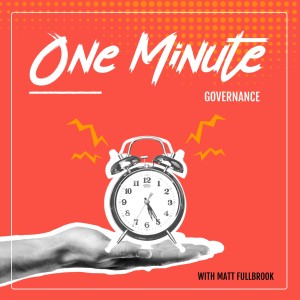
145K
Downloads
272
Episodes
Season 5 is live! New episodes every Monday and Thursday. This season, we’re exploring questions that directors need to *answer*. Are you a director, senior executive, investor, or someone who’s just curious about corporate governance? Tune in for insights about how things work inside and outside the boardroom, based on 20 years of experience and interactions with thousands of directors from around the world. Each episode lasts about one minute and will provide you with questions to ask yourself, your board and your management team, designed to optimize the way your organization makes decisions. Matt Fullbrook is a corporate governance researcher, educator and advisor located in Toronto.
Season 5 is live! New episodes every Monday and Thursday. This season, we’re exploring questions that directors need to *answer*. Are you a director, senior executive, investor, or someone who’s just curious about corporate governance? Tune in for insights about how things work inside and outside the boardroom, based on 20 years of experience and interactions with thousands of directors from around the world. Each episode lasts about one minute and will provide you with questions to ask yourself, your board and your management team, designed to optimize the way your organization makes decisions. Matt Fullbrook is a corporate governance researcher, educator and advisor located in Toronto.
Episodes

Thursday Jun 01, 2023
160. Express yourself (Condition #9: personal style)
Thursday Jun 01, 2023
Thursday Jun 01, 2023
Before sitting down to start writing the scripts for this season, I wrote a list of the conditions I wanted to cover. Clearly, personal style is a condition that matters when we’re making decisions, but that doesn’t mean I really know how to define it. It’s not the same as personality, exactly. Or is it? It’s also obviously not about fashion sense, but maybe fashion sense is a *result* of our personal style? Maybe what I mean by style is the intentional expression of personality. Like if personality is someone’s intrinsic character, then style is how they choose to express it. It might be a feature of someone’s personality, for example, to feel confident expressing their feelings and opinions. The style in which they choose to do so might be through humour or sincerity or song or a combination of the above or something completely different. Some people may dress a certain way to express elements of their personality, and others might prefer more subtle signals. In any case, a boardroom is a room full of people, each with their own style. It can be a place where some people feel safe expressing their style, while others don’t. It can be a place where we encourage styles that are inclusive, or fail to discourage styles that are toxic. It can be a place of inspiration, or a place of convention. When you walk into the room, how will you choose to express the features of your personality? How interested are you in how that choice might affect the others in the room? If the answer is “not really interested at all,” then you might want to review our working definition of good governance.

Wednesday May 31, 2023
Ground-Up Governance Definition #5 - Duty
Wednesday May 31, 2023
Wednesday May 31, 2023
Every Wednesday, OMG will share an audio version of a definition from the Ground-Up Governance platform.

Monday May 29, 2023
159. Everyday People (Condition #8: Demographics)
Monday May 29, 2023
Monday May 29, 2023
It’s been a bunch of months since I realized that there’s a really strong overlap between good governance and equity, diversity & inclusion. For a refresher of what I’m talking about, listen back to episode 113. ED&I and good governance may not be identical, but maybe a good way to put it is that you can’t be intentional about cultivating effective conditions for making decisions without being intentional about ED&I. Many people are still quick to point out that diversity of demographic characteristics like race, ethnicity, age, gender, and socioeconomic status among MANY others, won’t guarantee diversity of thought and perspective. My first response to that is “are you *sure* about that?” My more thoughtful response is that even if it’s not a guarantee, it definitely is a shortcut. I mean, a room full of people who look completely different from each other is more likely to have meaningful diversity of thought than a room full of people who look the same. Think of demographic diversity as a diversity of thought hack. Anyway, if good governance is impossible without ED&I, and the diversity part of ED&I is a condition that we have control over, then it’s clear why it belongs in our list this season. This may be one of the more complex conditions because it involves investment in building a community, which takes time. We also have to be conscious of tokenizing and other challenges we might encounter in doing the *inclusion* part of ED&I well. But don’t try to tell me that you have no way to be intentional about demographic diversity in your organization, your executive team, your boardroom, because…well, come on.

Thursday May 25, 2023
158. More and more about less and less (Condition #7: Expertise)
Thursday May 25, 2023
Thursday May 25, 2023
In the previous episode we talked about technical skills, and the potential need for expertise in a bunch of technical areas. Expertise is weird – for a good summary of exactly how weird, check out Range by David Epstein. Expertise also has a strange relationship with overconfidence, including that people with *deep* expertise tend to have way too much confidence in their ability to make predictions in their area of expertise. So, we have to be careful about balancing technical skill with diversity – including maybe having non experts or even naivete in the room. Someone who’s naïve also needs to be brave enough to slow the experts down and say “I have no idea what you’re talking about and I’d rather not move ahead until I understand.” That’s pretty hard, especially in an intimidating place like a boardroom. Anyway, it’s already clear why expertise is one of the conditions that matter for good governance, in part because we clearly have control over who’s in the room. We have at least *some* control over who our executives and board members are. We have a lot of control over whether we engage specialized consultants and who they are. We can think about exactly who we will engage at different stages of our decisions and how we’ll do it. Will we ask our experts to make crappy predictions? Maybe we can ask them to ask *us* questions instead like we talked about back in episode 119. It’s not rocket science. Unless it is, in which case you probably want a rocket scientist in the room, and maybe also a Rocket League expert just to balance things out.

Wednesday May 24, 2023
Ground-Up Governance Definition #4 - Delegate
Wednesday May 24, 2023
Wednesday May 24, 2023
Every Wednesday, OMG will share an audio version of a definition from the Ground-Up Governance platform.

Monday May 22, 2023
157. Skills to pay the bills (Condition #6: technical aptitude)
Monday May 22, 2023
Monday May 22, 2023
Every organization does complicated stuff that’s hard for the rest of us to understand. Not to mention, every organization has to somehow measure whether it’s doing that complicated stuff well or not, which is even more complicated. Add on top of that the fact that every organization’s complicated stuff affects groups and individuals inside and outside the organization in complicated ways. It’s a lot. It wouldn’t be very good if our CEO didn’t understand how our complex operations worked. It wouldn’t be good if none of the board members understood, either. But, let’s say we have a company that makes robots that perform brain surgery. Do you need your CEO to be technically skilled at surgery AND robotics AND software development in addition to all the regular CEO stuff like managing people and projects and financial oversight etc. etc.? What about the board? How many surgeons do you need on a ten-person board? Is it ten? Zero? How many robotics specialists? Accountants? Lawyers? If it’s zero, how do we communicate the important surgical stuff to them in a way that they will understand and feel confident being accountable for? If it’s all ten, where do we find these people who have technical expertise across so many different – and divergent – factors? Don’t forget that you can always supplement with consultants and stuff. No matter what path you choose, there are trade-offs that affect decision-making conditions.

Thursday May 18, 2023
156. ...and also with you (Condition #5: information style)
Thursday May 18, 2023
Thursday May 18, 2023
I find it really interesting, strange even, that some people HATE sci-fi but LOVE fantasy, or vice versa. And lots of other people hate or love both. All this despite the fact that they are simply styles of worlds in which stories are set. I mean a magical hero *should* be just as compelling whether they’re flying a spaceship or a dragon, right? But that’s not how things work. Style matters. Bland and factual or hilarious and abstract? Long and descriptive or pithy and metaphorical? The fact is that there’s no perfect balance that will engage and inspire everyone. And that’s really the point I’m trying to make here. Some people in the room will be inspired by wizards, and others by Jedi, and there may be no middle ground. This is pretty closely tied to the information medium piece in episode 152. Even though the idea of learning styles like “visual learners” has been debunked, that doesn’t mean that different ways of presenting information won’t inspire different people in different ways. Remember in episode 129 when I said Thing Explainer by Randall Munroe might be the best management book ever? What I like about it isn’t just that it’s got really cool illustrations and simple language (although that’s a HUGE part of it). I also like that he takes very serious and complicated stuff and isn’t afraid to make it a bit silly. The silliness makes it more accessible to me. For others, it might be a turnoff, maybe because it feels patronizing. For me, though, it’s the Goldilocks zone – just right. I learn a lot and have fun at the same time. It’s too much to expect that the people sharing information with your board will be gifted storytellers, but I don’t think it’s unreasonable to step back and ask what the current style or vibe is, and whether trying something a little bit different might help to engage people’s attention and imagination.

Wednesday May 17, 2023
Ground-Up Governance Definition #3 - Accountability
Wednesday May 17, 2023
Wednesday May 17, 2023
Every Wednesday, OMG will share an audio version of a definition from the Ground-Up Governance platform.

Monday May 15, 2023
Monday May 15, 2023
Remember that wish list from last episode about boards wanting information that’s shorter, more detailed, and sooner? What are they *really* asking for? They just want to be able to come to the table knowing as much useful stuff as possible. That sounds pretty reasonable, right? Funny thing about the content of board pre-reads is that a lot of it is stuff that nobody needs to know or wants to talk about. Sometimes that’s because of regulations – meaning the content *has* to be there, even if it’s useless. But sometimes it’s something less defensible, like 40 years ago some director asked for a report on usage stats for VHS vs. Betamax and for some reason management still puts time into crafting that report before every board meeting just. because. we’ve. always. done. it. that. way. So you can imagine why having a bunch of useless information in the pre-reads might be a problem. But it’s not just about editing. We can also think about the balance between reporting on the past and asking questions about the future. We can think about the balance between reporting facts and sharing opinions or forecasts. We can think about the balance between data dumps and pithy summaries. But you can be sure about one thing, every decision about what to include or exclude *will* affect directors’ ability to come to the table ready to engage.

Thursday May 11, 2023
154. ...to rock a rhyme that’s right on time (Condition #3: information scheduling)
Thursday May 11, 2023
Thursday May 11, 2023
I sometimes remind senior executives that their board’s information wish list is that they want it shorter, more detailed, and sooner. And yeah, sometimes those wishes are mutually exclusive. We’ve all heard the famous Mark Twain quote: “sorry for the long letter – I didn’t have time to write a short one.” And it’s true: creating something brief that also has substance takes time and practice…I should know. But I also think we tend to over-index on the timing piece. Think about it: your board doesn’t need all of the material at the exact same time. It’s not like they’ll consume every part of it simultaneously. It makes sense to have deadlines for getting critical material to your board to make sure they have time to actually consume and understand it. Also to get their thoughts and feelings and questions sorted before they come to a meeting. But it’s also not like they will somehow refuse to read, or watch, or listen to something just because it comes through a week earlier or two days later than the rest of their pre-work. In fact, sometimes we get brilliant last minute ideas or urgent information that we just *have* to share at the 11th hour. It’s cool – don’t worry about it. But for the rest of the information you’re sharing with your board I think it’s worth wondering how you can time the dissemination in ways that might make their lives easier, or might make them more likely to engage in future-oriented thinking. If you provide a written brief on Monday, could it help to follow up on Friday with a voice memo or podcast that sheds additional light on the topic? Could it help to provide weekly updates by video in between board meetings to keep the juices flowing before the main packet goes out? Different approaches will work in different circumstances, but you can start by just trying new stuff!

Wednesday May 10, 2023
Ground-Up Governance Definition #2 - Power
Wednesday May 10, 2023
Wednesday May 10, 2023
Every Wednesday, OMG will share an audio version of a definition from the Ground-Up Governance platform.

Monday May 08, 2023
153. Flip the script (Condition #2: information format)
Monday May 08, 2023
Monday May 08, 2023
Let’s say you’ve decided to start a podcast to include as part of your board pre-work. You’ve got a lot of decisions to make. Will it be scripted or spontaneous? Will it be one voice – maybe your CEO – or many, like the entire executive team? Will it be short, pithy, and brilliant like OMG, or long, boring and arduous like other podcasts (sorry). Maybe it will be an interview format. Maybe those interviews will be featured exactly as they happened for completeness, or maybe they will be edited to pick out the juiciest bits with some voiceover added for emphasis. And so on, basically to infinity. Pick a medium and the formatting choices are kinda endless, from font and font size, to length, to punctuation styles, to pull quotes. Some of the formatting might be intended to keep the consumer’s attention, and some might be intended to just add fun flair. Some might be intended to make sure specific pieces of information get seen…and retained. You might use one format for communicating facts and another for commentary. What I hope is obvious, though, is that you have *a lot* of control over formatting. I might even argue that formatting can serve you really well, but that if you don’t put much thought into it, it’s probably serving you poorly. So…let’s be intentional about it, shall we?

Thursday May 04, 2023
152. It *is* the message (Condition #1: information medium)
Thursday May 04, 2023
Thursday May 04, 2023
There’s a quote I really like from an article called The Elements of Good Judgment by Sir Andrew Likierman in HBR back in January 2020. Also the article has a beautiful image at the top of what looks like a great gray owl with a super poofy face. Anyway, the quote reads: “As a director of a large listed company, I would get up to a million words to read ahead of a big meeting. Confronted with such a deluge, it’s tempting to skim and to remember only the material that confirms our beliefs. That’s why smart leaders demand quality rather than quantity in what gets to them.” There’s a lot about this quote that I like, but I also see an opportunity missed. It’s just taken as granted that board pre-reads will be, well, pre-READS. Sure, those pre-reads are usually no longer literal physical binders – intimidatingly huge ones, at that – but don’t you find it a bit strange that Mr. Likierman’s focus is only on the amount of information, and not the medium? I mean, I think we can confidently say that people like consuming information through all kinds of media, right? You’re listening to a podcast right now, for instance. Later, you might stream a video on Netflix or Disney or YouTube, or poke through Twitter or Instagram or TikTok. Maybe your team at work does most of its interaction through Slack instead of email or phone or text. Maybe you like looking at your calendar on your desktop computer more than on your phone. Maybe you’re reading the transcript of this podcast instead of listening to it. Anyway, the medium matters. Each of the media I’ve mentioned in this episode *COULD* be an element of your board packet. And all of them are better than a million words in PDF format.

Wednesday May 03, 2023
Ground-Up Governance Definition #1: Authority
Wednesday May 03, 2023
Wednesday May 03, 2023
Every Wednesday, OMG will share an audio version of a definition from the Ground-Up Governance platform.

Monday May 01, 2023
151. The latest and greatest definition of ”good governance”
Monday May 01, 2023
Monday May 01, 2023
Finally! Season 4 of OMG. Let's start with Matt's latest definition of "good governance"
SCRIPT
Welcome to season 4 of One Minute Governance! This season is gonna be a bit different. Well, I mean it’s mostly gonna be the same. 60-90 seconds or so of me talking about governance stuff a couple times a week. The different part is that there’s a season-long theme. Let me explain. My current wording of my definition of good governance (yes, it’s different again) is “good governance is intentionally cultivating effective conditions for making decisions.” I’ve been testing this out on a bunch of different audiences and it’s resonating – for the most part – pretty strongly. But there’s a sensible question that comes up almost every time: “what do you mean by ‘conditions’?” Good question, right? And it’s completely true that the word “conditions” is doing a *lot* of work here. Like, a lot a lot. And the fact is that there are *tonnes* of conditions that affect our decisions – many of which we can be intentional about. So, 47 of the remaining 49 episodes of season 4 will each be about one of those conditions, why it matters, and how we can influence it. These 47 conditions are…not arbitrary, exactly, but certainly far from an exhaustive list. Some may seem obvious, others trivial, and others still that will be left out for no reason other than I didn’t think of them or ran out of time or whatever. Either way, I hope that the journey over the next few months will spark some ideas about how you might intentionally cultivate effective conditions for decision-making in your next board meeting, family dinner, bachelorette party, or whatever. See you in a couple of days!
